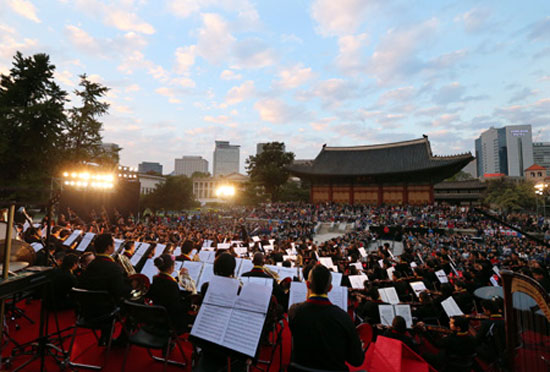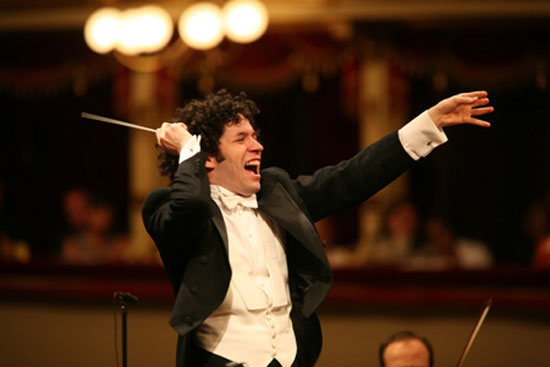- California Assembly OKs highest minimum wage in nation
- S. Korea unveils first graphic cigarette warnings
- US joins with South Korea, Japan in bid to deter North Korea
- LPGA golfer Chun In-gee finally back in action
- S. Korea won’t be top seed in final World Cup qualification round
- US men’s soccer misses 2nd straight Olympics
- US back on track in qualifying with 4-0 win over Guatemala
- High-intensity workout injuries spawn cottage industry
- CDC expands range of Zika mosquitoes into parts of Northeast
- Who knew? ‘The Walking Dead’ is helping families connect
Can Korea find its own Dudamel?

Youth orchestra musicians from Venezuela and Korea perform during a joint concert on Oct. 20 at the Deoksugung Palace in Seoul. (Yonhap)
By Do Je-hae
By now the world of classical music is all too familiar with Gustavo Dudamel, the superstar conductor who some European press is already seeing as a candidate to take up the top post in his profession ― the music directorship of the Berlin Philharmonic.
For now, he leads the Los Angeles Philharmonic and the Simon Bolivar Symphony Orchestra. Just as important as the lucrative conducting jobs he holds is his impact as a music education advocate. He may be among the hottest conductors at the moment, but his musical beginnings were humble when he started playing the violin and conducting in a youth orchestra in Venezuela.
Dudamel is the most famous musician trained through the El Sistema, a state-funded music education program for disadvantaged youth that has redirected the lives of countless at-risk children. The program started 38 years ago and it has spread to more than 30 countries, including Korea. The inspiring journey of El Sistema is documented in several books and films.
Dudamel isn’t the only elite musician to benefit from El Sistema. Edicson Ruiz made headlines when he joined the Berlin Philharmonic at age 17, becoming the youngest member and the first South-American to enter the prestigious orchestra.

Gustavo Dudamel, who at 28 became the youngest music director in the history of the Los Angeles Philharmonic, is the most famous musician to have trained under the El Sistema network of youth orchestras in Venezuela. (Courtesy of Credia)
These two musicians have been instrumental in drawing international attention to El Sistema, inspiring similar movements in many countries in the last decade or so. Through the Youth Orchestra LA (YOLA) program ― inspired by Venezuela’s revolutionary El Sistema ― the LA Philharmonic and its community partners provide free instruments, intensive music training, and academic support to students from underserved neighborhoods.
Korea adopted its own version of El Sistema in 2010, under the management of the culture ministry. As a result, youth orchestras consisting of underprivileged students have been established in selected public institutions.
When the El Sistema founder Jose Antonio Abreu visited Seoul last week, he brought with him the Caracas Youth Orchestra, which was the impetus for the El Sistema, for a joint concert with Korean musicians.
The former Venezuelan culture minister gave a positive outlook for Korea’s venture into El Sistema. “Korea produces fine musical instruments and has a wealth of qualified teachers,” Abreu said during a press conference in Seoul.
The ultimate goal of El Sistema, he said, was not to nurture elite musicians, but to raise healthy citizens through early music education.
“In my view, the root cause of all our social problems is exclusion. We must fight to ensure that a large number of people ― everyone, if that’s possible ― have access to this wonderful world of music, the world of the orchestra, the world of song, the world of art,” Abreu said.
Korea’s version of El Sistema, the “Dream Orchestra” program, is still in its initial stages, so it’s premature to assess its outcome. However, there are signs that the program may be short-lived, largely due to budgetary limitations.
The Korea Arts & Culture Education Service, an affiliate organization of the culture ministry, manages the program. It has selected 30 institutions, including schools and district offices, to run youth orchestras. Currently, there are 1,600 involved in this program. Their training and instruments are funded by the ministry, but only for three years. At the moment, it is unclear what will happen to the program in 2014, when the program expires.
The culture ministry runs about 30 projects on promoting arts in schools. It has been only since 2005 that youth orchestral projects became an agenda for cultural and education policymakers. Due to an environment that undervalues music education in general, relevant projects have not been able to take root or produce tangible outcomes.
The education ministry also funds a youth orchestra program in 400 schools across the country. But there are criticisms that the students who truly need the program have been sidelined.
According to a report by Rep. Kim Se-yeon of the ruling Saenuri Party last month, only 25.4 percent of the total number of musicians in the program was from impoverished neighborhoods. This is far below the original aim of the ministry to fill more than 50 percent of the participants with students from such neighborhoods. Some schools were found to be collecting fees from students, which also goes against the program’s founding principles. The education ministry funds the program for only two years.
“The government needs to extend more concrete and lasting support in order to fully do justice to the program’s purpose of improving the lives of underserved children,” Kim said in a statement.














